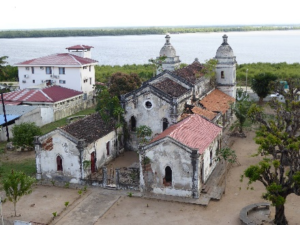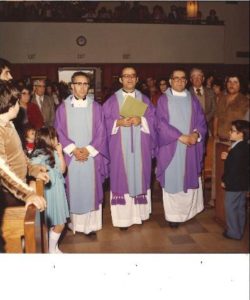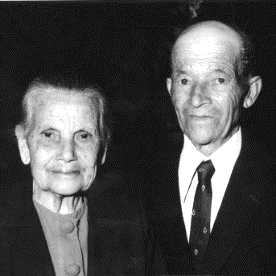Eulogy given by Father Bernardino’s Nephew at the English Mass 21/1/2024
Hello my Brothers and Sisters.
I am supposed to talk to you about my Uncle, Father Bernardino, but in these recent days, I’ve heard so many amazing testimonies from so many of you, that I fear I have very little to add. I could tell you he had a golden heart and a willingness to put others before him, but you already know that. I could tell you he had a contagious laughter and could raise the spirits on any occasion, but I think you know that too. I could tell you that he brought out the best in the people around him, but yeah, nothing new there.
So instead, I would like to delve with you, about one of the most significant lessons he imparted to me.
I recently discovered that there are multiple interpretations of one of my uncle’s favorite biblical stories: “The Good Shepherd”.
I thought there was only one interpretation. The one my Uncle taught me. The one that I believe is the foundation that permeated all of his philosophy and beliefs.
In John 10 14-15 Jesus says, “I am the good Shepherd; I know my sheep and my sheep know me just as the Father knows me and I know the Father—and I lay down my life for the sheep.”
You see, some interpretations focus on Jesus as the Shepherd, and us as the sheep. In other words, all we need to do, is revere our Shepherd, and passively leave the flock in his hands. But as you probably know, my Uncle had a different vision about many of Jesus’ teachings.
You see, as many people do, my Uncle believed that Jesus was not simply our Savior, he was also a reference, a guide. He came to us to teach us how to navigate God’s creation.
You know the phrase “What would Jesus do?”? That phrase was his compass.
So for him, this story wasn’t about finding safety in Jesus embrace, it was about recognizing how anyone can be the sheep, but anyone can also be the Shepherd. For him, this story was about how despite some sheep being terribly annoying, some noisy, some even smelly, some weak, or hurt, or lost, we are all in the same flock, we are all family. A big family for sure, but a real true family, and as the “great poet” Stitch said, Ohana means family, and in a family, no one is left behind.
In Luke 15, on the parable of the lost sheep, Jesus makes exactly this point: even with 100 sheep in your care, if one is weak, lost, afraid, a Shepherd is always ready to find her, bring her back to safety and nurture her back to health.
We are all sheep in this huge flock, and we are all our brothers and sisters Shepherds, and we should never, ever, leave anyone behind, especially the ones that are more fragile.
So to bring this interpretation home, i’d like to read you another passage from Mathew 25 on the Sheep and the Goats:
“He will put the sheep on his right and the goats on his left.
Then the King will say to those on his right, ‘Come, you who are blessed by my Father; take your inheritance, the kingdom prepared for you since the creation of the world. For I was hungry and you gave me something to eat, I was thirsty and you gave me something to drink, I was a stranger and you invited me in, I needed clothes and you clothed me, I was sick and you looked after me, I was in prison and you came to visit me.’
Then the righteous will answer him, ‘Lord, when did we see you hungry and feed you, or thirsty and give you something to drink? When did we see you a stranger and invite you in, or needing clothes and clothe you? When did we see you sick or in prison and go to visit you?’
The King will reply, ‘Truly I tell you, whatever you did for one of the least of these brothers and sisters of mine, you did for me.’”
‘Truly I tell you, whatever you did for one of the least of these brothers and sisters of mine, you did for me.’
And here, against any other interpretation, he is directly saying that the sheep, were also the shepherds of their brothers and sisters.
There is a saying in Portuguese that roughly translates as “He who kisses my children, sweetens my lips”. I think God would like that saying.
I apologize for turning this into a sermon rather than a more traditional eulogy about my uncle’s life, but I’m confident he would appreciate that my tribute to him centers on his favorite teaching: “we were put here to love” – “We were put here for each other”. Think about it, without love and care for each other, we would all die alone.
And you know it’s true because we do love, and we do care for each other. The hard part is caring for those sheep that are too noisy for our delicate ears, or too smelly for our nose, or too weak for all the work they give us, or too lost for our comfort. Fr. Bernardino would argue that those are precisely the ones that need the Shepherd’s guidance the most.
So I challenge you to ask: “how can I bring safety to my fearful brother? How can I guide my lost sister? How can I nurture my weakened family? How can I be the Shepherd that works for a better flock?”.
Of course this doesn’t mean that you should always be looking for ways to intervene, nor spend your life in service of others the way my Uncle and many others did and do, but at the very least, if you find any of those hurting sheep, don’t turn away. Just ask that very, very simple question: How can I help?
If you do that, I promise you there will be one very happy Bernardino up there, thanking you for being your brother’s shepherd.
—————————————————————————————


